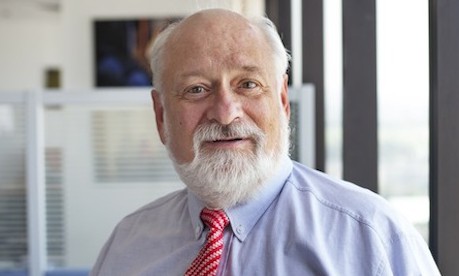There is a riddle among priests that I have heard on every continent I have ever visited (all but Antarctica).
The question is: “What are the three things God doesn’t know?”
The third of the answers is: “What will the Jesuits be up to next?”
Certainly much of the world is curious to know what one Jesuit in particular will do next as bishop of Rome – Pope Francis.
More than a year after his election, some of the euphoria over how his style differs from what people had come to expect in a pope is beginning to give way to impatience.
Just days ago, an editorial in the New York Times called upon him to act against an archbishop in the United States who has been credibly accused of covering up the sexual abuse of children.
Such impatience is not limited to that newspaper, nor to that country.
People are now wondering when style will yield substance.
As the riddle implies, trying to guess what a Jesuit is going to do next can be a futile exercise, but I will go ahead and take the risk.
Part of the Jesuits’ charisma, enshrined in the Spiritual Exercises of their founder St Ignatius Loyola, is something known as “discernment”.
Simply put (from an outsider’s perspective), it involves a prayerful and reflective searching out and examining of all the relevant matter connected with a decision.
Then, when all has been thoroughly explored under the hoped-for guidance of the Holy Spirit, one acts.
Recently, we have seen evidence that this is how Francis spent his first year as pope.
And now, he is beginning to make moves.
The cleaning out of the Vatican bank administration and the appointment of a cardinal to oversee Vatican finances are two such moves.
The pope has set up commissions to deal with the sex abuse crisis and to straighten out the notoriously disorganized Vatican communications situation.
He has removed from the Vatican office that handles the appointment of bishops a cardinal noted for his affection for the cappa magna (a cape with a train so long that it requires a team of lackeys to carry it) so that he might be replaced by someone more interested in finding new bishops who fit Francis’ image of shepherds who smell of the sheep.
So we are, perhaps, beginning to see the fruits of this particular Jesuit’s discernment.
However, there are other areas where people are looking for papal leadership.
Relaxing the rule of celibacy for priests in the Latin Rite is one of them.
Repudiation of imposed liturgical translations is another.
However, I suspect that in neither case can we expect decisive papal action.
Even recognizing the riddle’s warning about presuming to figure out a Jesuit, I posit that the reason for this is that Francis has a bigger agenda item that such moves on celibacy et al would undermine.
I think the pope wants to dismantle the centralized monarchical papacy that has its roots in the nineteenth century.
He has already made clear his commitment to a more synodical approach to leadership and a return to ancient traditions about the role of the pope and his curia.
Francis could, for example, change the celibacy rule by decree, but that would simply reinforce the version of the papacy as a system of one-man absolute rule.
He apparently feels or discerns that at this point in history one thing the Church does not need is an exercise of such power.
Following a meeting with Pope Francis last April, Bishop Erwin Kräutler of Xingu in Brazil said, “The pope explained that he could not take everything in hand personally from Rome.
“We local bishops, who are best acquainted with the needs of our faithful, should be corajudos, that is ‘courageous’ in Spanish, and make concrete suggestions.”
In other words, the pope seems to be waiting for bishops, and especially bishops’ conferences, to take courageous responsibility for proposing directions.
Then he as pope can respond to those proposals.
Celibacy is not the only matter to be dealt with by the bishops who must contend with a shortage of priests.
The Rome-imposed Latinization of liturgical translations is another matter.
But, the issue must go beyond translations.
How about the development of appropriate liturgies for the various cultures of the world so that we no longer need worship as sixth-century Western Europeans?
It would be a service not only to Catholics in Asia, but throughout the world and even to Pope Francis if Asian bishops’ conferences either individually or through the Federation of Asian Bishops’ Conferences were to grapple with some of the issues that need resolution without waiting for edicts or permission from on high.
It might give Pope Francis the result he is actually hoping to see by holding back.
[By the way, the other two answers to the riddle are: “How much wealth do the Franciscans have?” and, “How many communities of sisters are there in the Church?” An Indian priest I met added, “What becomes of the Mass stipends?”]
- Maryknoll Fr William Grimm, based in Tokyo, is publisher of ucanews.com
- Article republished with permission
News category: Analysis and Comment.




